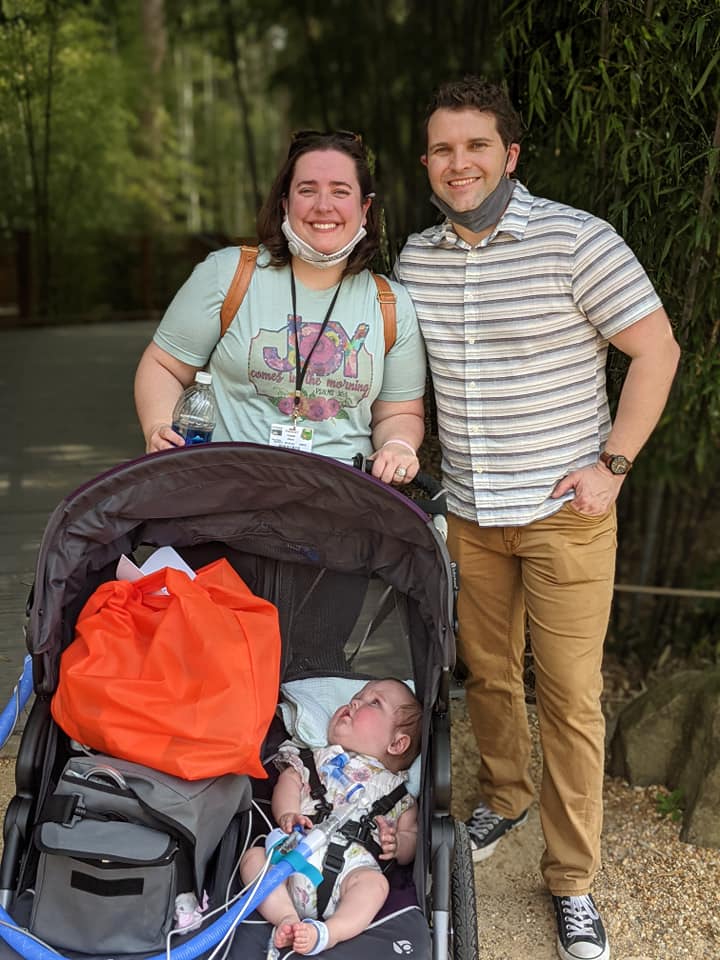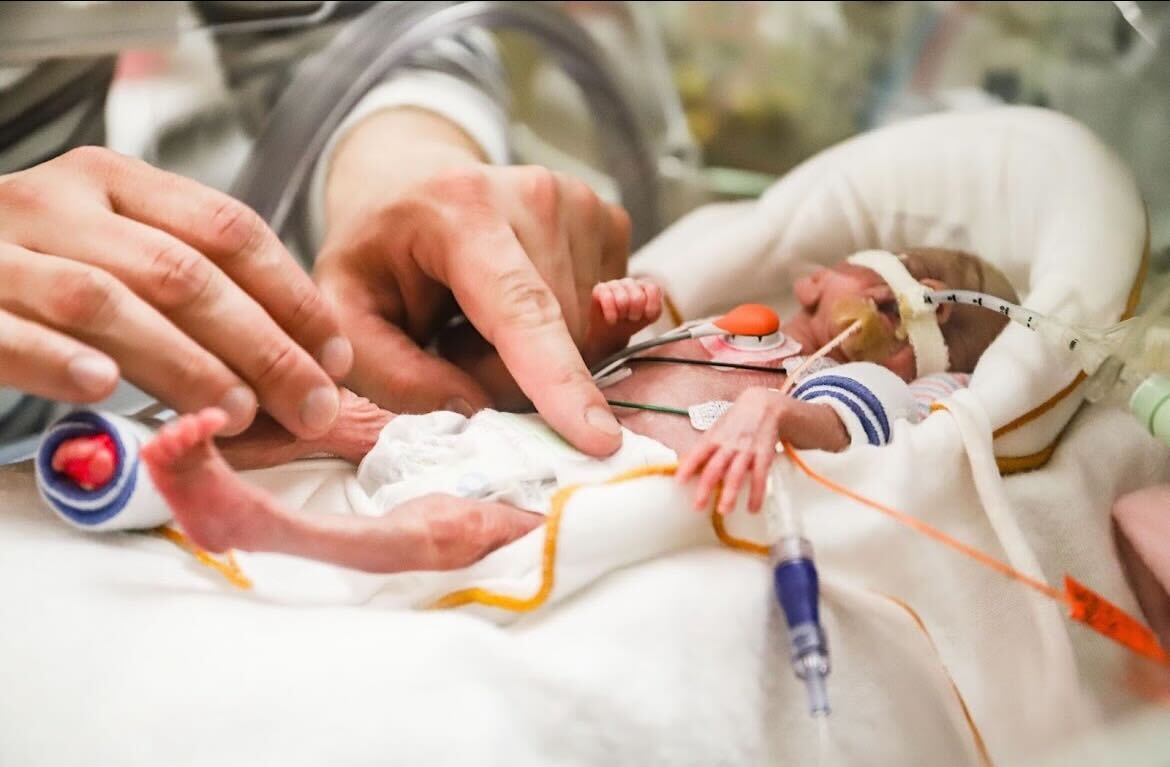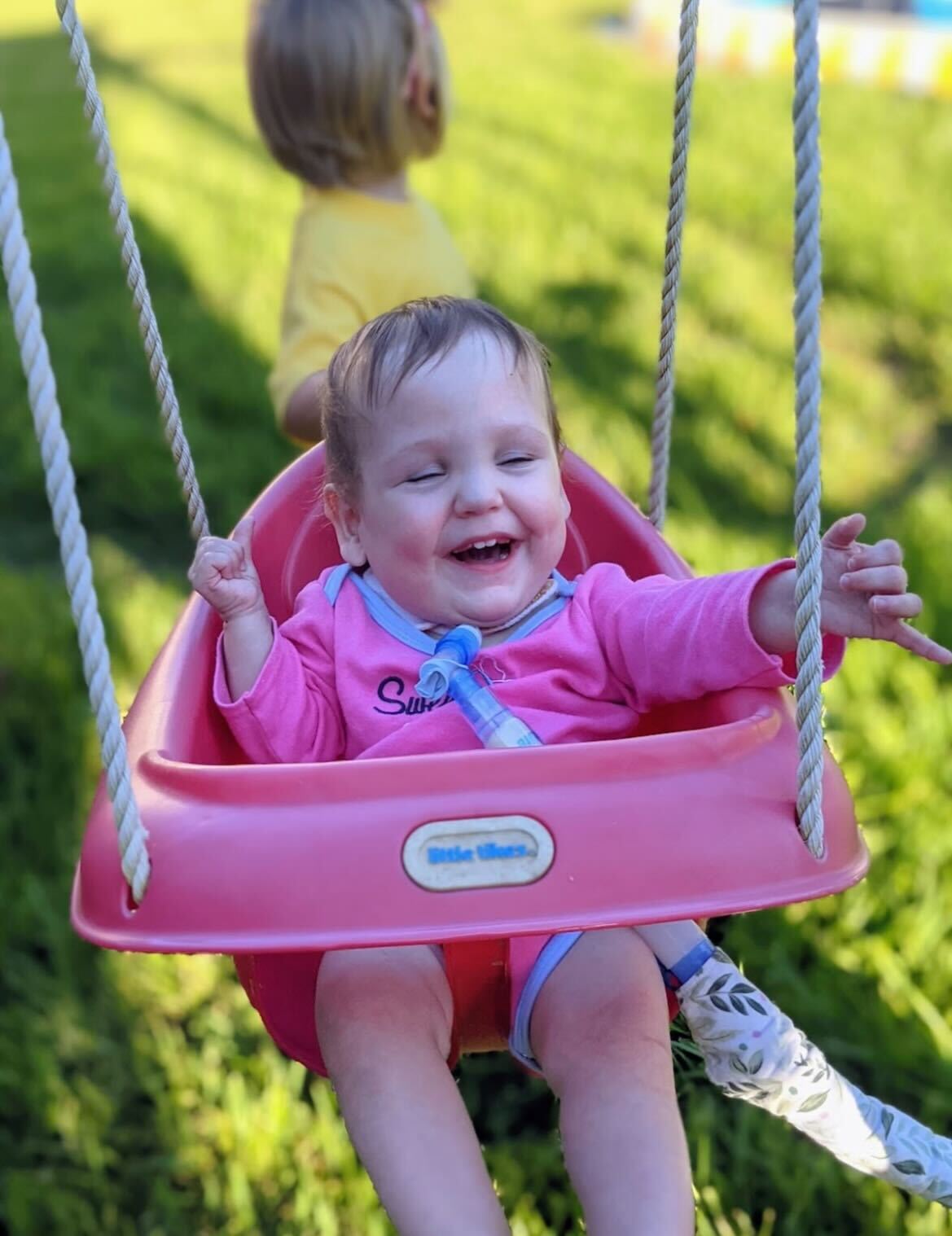 Crystal and Alex Odom with daughter Everleigh (photos provided by the Odom family)
Crystal and Alex Odom with daughter Everleigh (photos provided by the Odom family)
Written by: Kenia Hernandez
At 17 weeks pregnant, Crystal Odom and her family were packing to leave for Thanksgiving to Savannah, Georgia when she felt an intense amount of pressure and had to be rushed to UAB for an emergency cerclage due to an incompetent cervix, a condition that causes the cervix opens too soon during pregnancy.
Suddenly Odom, who had worked at UAB for four years and is now a program manager for the Department of Family and Community Medicine, found herself on the patient side of the story.
Odom’s medical team continued emergency care and placed a single stitch around her cervix to prevent a miscarriage or preterm delivery. A few weeks later, Odom went into early labor and her daughter Everleigh was born on Jan. 8, 2020 at 23 weeks and five days old.
“She was tiny, but she was born just feisty,” Odom said. “She came out kicking.”
Early Arrival
Everleigh Odom spent the first 14 months of her life at the University of Alabama at Birmingham Regional Neonatal Intensive Care Unit and Children’s of Alabama.
 Everleigh's early days in the hospital (photos provided by the Odom family)
Everleigh's early days in the hospital (photos provided by the Odom family)
Thanks to the incredible care she received, today Everleigh lives at home along with her mom, dad, Alex Odom and big sister Adeline. The Odoms have also gained new opportunities to help people who are going through medical journeys similar to Everleigh’s. Crystal Odom will serve on a parent advisory council appointed by the governor for Alabama’s Early Intervention System Governor’s Interagency Coordinating Council (ICC).
The whole process showed Crystal Odom firsthand how supportive and flexible UAB is with its patients and employees. She was able to work a hybrid schedule when she received her emergency cerclage and work from Everleigh’s NICU room after she was born.
“My previous department in radiology was there every step of the way and supported me so much in my journey with Everleigh,” Odom said. “I could not have done it without them.”
Crystal says that her managers and coworkers Department of Radiology never once made her feel like her daughter’s needs weren’t important and she is grateful for that.
She was also able to see a different side of her work at UAB. Odom’s previous position was in the Department of Radiology, in administration and did not see day to day clinical operations. But when Everleigh was born, this completely changed.
“Everleigh sometimes needed numerous x-rays a week depending on her lung status as well as other diagnostic testing on her heart and brain,” Odom said. “I am still amazed at what these individuals do for patients on a day-to-day basis.”
Critical Period for Everleigh
Crystal Odom said that Everleigh did struggle at first and that there were about three times she almost died in the first few months of her life. Due to Everleigh’s underdeveloped lungs, machines were breathing for her. Everleigh later developed pulmonary hypertension due to her heart and organs being underdeveloped. Odom explains that they thought Everleigh didn’t have hypertension anymore after two weeks, but she went into a hypertension crisis and it took her a couple of weeks to get out of distress.
Everleigh was also diagnosed with bronchopulmonary dysplasia (BPD) and cerebral palsy. BPD is a chronic lung disease that most often affects newborns, premature infants or infants on the ventilator. The lungs and airways (bronchi) are damaged causing tissue destruction (dysplasia) in the tiny air sacs of the lung (alveoli). If a baby needs to be on the ventilator longer than 30 days, it is more than likely they are going to develop BPD. Everleigh showed signs of BPD earlier than usual at 26 days. She was showing signs of scar tissue that the ventilator was causing but that was also keeping her alive.
When Everleigh reached six months of age, her parents began discussing the possibility of a tracheostomy with the respiratory therapist and medical team. A tracheostomy is a surgically-created opening through the neck into the trachea to allow direct access to the breathing tube. Everleigh’s parents could see her struggling extremely hard to breathe so they knew the direct access to the breathing machine, often called a “trach,” would be the best for her well-being.
Around that time, Everleigh’s family and care team recognized the signs of a hypertension crisis again and she was transferred to Children’s Hospital. She received the tracheostomy surgery less than a week later.
A Turning Point for the Odoms
 Everleigh enjyoing life at home with her family after her successful tracheotomy surgery (photos provided by the Odom family)
Everleigh enjyoing life at home with her family after her successful tracheotomy surgery (photos provided by the Odom family)
“After the surgery she was a different baby,” Crystal Odom said.
Because Everleigh had a stable airway, she continued to improve physically and socially. This tracheostomy also allowed her to participate in Children’s of Alabama’s Pulmonary Technology Dependence Program. The Children’s of Alabama’s Pulmonary Technology Dependence Program is within the Division of Pulmonary Medicine that specializes in providing care for technology dependent children who have chronic respiratory insufficiency or failure and require specialized medical equipment for support. This program includes those who require tracheostomy, ventilator support, BiPAP, oxygen supplementation, cardio respiratory monitors and oximeters.
Everleigh’s family could finally get her out and get her moving. They were able to hold her all the time without worrying about too many bulky machines getting in the way.
The Odoms were very proactive in caring for their daughter as she began to transition from care in the hospital to care at home.
“It had been nine months of every day of my life. I'm asking questions and I'm learning what is this? What is that?” Crystal Odom said.
The family was transferred to be closer to the pulmonary unit. Odom recalls being trained on the vent program and being scared. Doctors reassured her and her husband that fear was normal, and they continued in the training, determined to do whatever it took to get Everleigh home sooner.
“So, for the rest of the time, until she went home in March 2021, we trained,” Odom said.
UAB’s pulmonary team got Everleigh ready to withstand the home ventilator, which is slightly different than the ventilators in hospitals. The team also trained Crystal and Alex Odom to do trach and vent care intensively for four weeks from 8 AM – 4 PM every day.
“It was nerve wracking, but it does help prepare you,” Crystal Odom said. “I'm so glad we were trained, now it's just second nature.”
Odom and her family experienced first-hand the important role that UAB plays in all stages of patient’s medical journeys. From caring a 23-week-old baby to training to take a nearly one-year-old home. UAB provides amazing care as one of the region’s top NICUs.
Going Home
“I am so thankful I had Everleigh here [at UAB] and now have a chance to see her thrive at home because of their willingness to help babies at such a young gestational age,” Crystal Odom said.
You have to be able to save your child and do everything you can for them when they're not in the hospital, she noted. Now, two-year-old Everleigh is thriving at home with her family and a great team of therapists from United Ability. United Ability is an early intervention provider for the state of Alabama. The Hand in Early Prevention program provides services for infants and toddlers with delays in development, disabilities and children at risk for developmental delay in the first three years of life.
Everleigh has three therapists who make regular home visits.
Unique Opportunities to Serve
Crystal Odom makes an effort to meet with the therapists and ask questions about the skills and activities Alex Odom and she can work on. They work together to help Everleigh reach the next step in her medical journey.
The Odoms were also nominated by their speech therapist to join Alabama’s Early Intervention System Governor’s Interagency Coordinating Council (ICC). Crystal Odom will serve on the parent advisory council for 2022-2023. These nominees are appointed by the governor and the council must include 20% providers of early intervention services and 20% parents of infants or children with disabilities aged 12 or younger. This council decides what is working in the system, where the funds should go during the fiscal year and to give real life advice to parents and providers in the state.
“It was a blessing that they chose us,” Odom said.
With that work ahead, and Everleigh at home, the Odoms are thankful for everything that got them to this point. The blessings outweigh all that they have experienced and now it’s become second nature to them, she said. They can bring Everleigh everywhere with them, and she was even able to spend her second birthday at home with her loved ones.
“We came home in March of last year and it's been a blast,” Crystal said. “It's hard work, but it's such a blessing.”